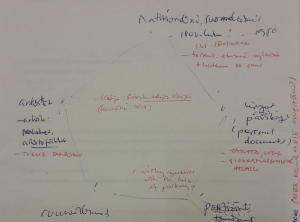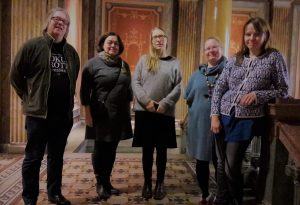Project

The project opens up new vistas for the interaction between archives and field through several case studies related to the history of Finnish ethnology, ethnomusicology and folklore studies. The critique towards ethnographic field as spatially, temporally and textually bounded entity will be combined with the notion of archives as historically and ideologically determined processes. The 5 anchor studies in the project will each focus on archived documents of field work and analyze the academic and bodily field work practices, cooperation and encounters, biographical and ideological contexts that all shaped these same documents. The project will re-evaluate our assumptions about field work and archives not just in the present, but also historically.

The research group consists of post-doc researchers from four different Finnish universities, having experience in fieldwork and archives studies in the disciplines of folklore, ethnology and museology. An important theoretical question is based on the participants’ exceptionally deep knowledge about field work in Russia: how does your own field experiences(your own travels) add to your reading of archived documents (about other peoples’ travels). Does your experiences from present day Russia help you to understand the experiences and work of the researcher from almost two hundred years ago?
The time frame of the project is exceptionally long, 200 years, covering the earliest field work based research by A.J. Sjögren (1794-1855) and extending to present day researches, among them ourselves. However, the aim of the project is not to rewrite the whole research history, but to concentrate to certain key moments along the historical line. All the case studies are based on close reading of the textualisations of field experiences, especially in the genres of field notes and letters. Also material documents of the field encounters are taken seriously as traces of the encounters with the ”other”, objectified people. Among the Finnish tradition researchers the ”others” were mostly Fenno-Ugrian people seen as ”relatives”, members of the same linguistic family. Knowing that we are not able or forced to jump out of this epistemological framework we still try to see within this project the quest for Fenno-Ugrian past in a transnationalistic contexts, as an outgrowth of the rise of nationalisms in the Finnish historical context.
The project Russia as a Field and Archive in collaboration with the Academy of Finland:
